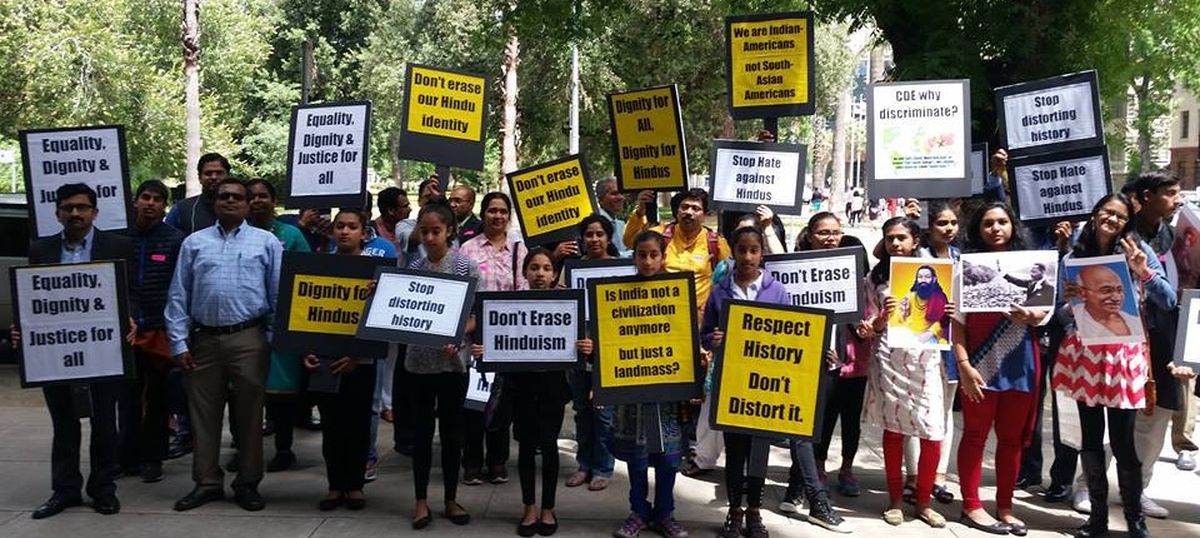The advocacy group wants to help voters make an 'informed choice' in the November 8 US elections, it said.

What is the red dot that many Hindu women wear on their forehead? Do Hindus have Commandments? What is the meaning of the swastika?
The answer to these and other such queries are part of the booklet titled More Answers to Real Questions about Hinduism, educational material put together by an advocacy group and sent on Tuesday to the presidential candidates for the upcoming US elections. So should Republican candidate Donald Trump seek clarity on when Raksha Bandhan is celebrated, or Democrat Hillary Clinton wonder whether Hindus believe in heaven and hell, they need not fret – the answers are within easy reach.
Not just this, the crash course of sorts also features information about the Hindu scriptures on the Vedas, and concepts of dharma (moral and religious law) and karma (actions).
The booklet, first released by the Hindu American Foundation, a non-profit advocacy group, in September 2010 (as a follow-up to the Short Answers to Real Questions about Hinduism, released in 2007) was sent to all four presidential candidates – Trump, Clinton, Jill Stein of the Green Party and Gary Johnson of the Libertarian Party. The spokesperson said the materials were sent with a broad educational intent.
The material was distributed days after Trump, at a fund-raising event organised by the Republican Hindu Coalition in Edison, New Jersey on October 15 said, “I am a big fan of Hindu, and I am a big fan of India. Big, big fan,” seemingly conflating the religion with the entire nation.
Though it did not comment on Trump’s statement, it is perhaps misconceptions such as these that the Hindu American Foundation wants to clear. “While the Hindu American community is growing in America in numbers and importance, it still remains very much a minority faith,” Mat McDermott, director of communications of the Foundation, told Scroll.in via email. “We hope the materials we’ve sent prove educational, and clear up any misunderstandings about the beliefs and practices of Hindus that may be out there.”
Big community, small voice
The US has more than two million Hindus, a group that has traditionally favoured Democrats. According to McDermott, though, the New Jersey event in support of Trump “shows that the Hindu American community is as diverse in their political beliefs as the greater public in the United States, and that you can’t take for granted Hindus voting for one political party or another."
He added, however, that "despite the turnout at the recent Trump event, we believe the stats show the majority of Hindus supporting the Clinton campaign.”
In a Pew Research Centre survey of the American public in 2014, Hindus received “neutral ratings” – falling in the middle – lower than the “warm ratings” for Jews and Catholics but higher than the ratings for atheists and Muslims.
The Hindu American Foundation claims that it seeks to serve Hindu Americans across the divide of class, gender, age and the like. It aims to create a better understanding about the religion among people and advocate the Hindu American community’s needs and interests to decision makers.
On its website, the group has an interactive learning space called Hinduism 101. A link to it and other printed materials, including the More Answers to Real Questions… booklet have been sent to all the presidential candidates. “With growing numbers comes an increasing awareness of a place in American dialogue and the need for the accurate portrayal of the faith in line with its beliefs and practices,” said a prologue to the question-and-answer format booklet.
Tacking stock
A crucial part of the correspondence is a questionnaire from the Foundation, seeking the responses of each candidate on questions affecting the Hindu American community. Among other things, the candidates have been asked how they propose to deal with countries such as Saudi Arabia and Pakistan where ethnic and religious minorities are discriminated against and been questioned on the technical aspects of visas issued to Hindu priests entering the country. Candidates can choose from the given options or then write a “free response”. They have been requested to send their responses by November 1, so that voters can make an informed choice when they go to polls on November 8.
“The collective responses, hopefully from all campaigns, will better inform our constituency and those who are dedicated to our mission of Promoting Dignity, Mutual Respect, and Pluralism as to which candidate they believe best serves these objectives,” said the letter from Suhag A Shukla, Hindu America Foundation executive director and legal counsel, to the candidates.
This is the first time the Foundation has undertaken such an outreach exercise, though they have published voter guides in the past. “With all the rhetoric in this year’s election cycle vis a vis immigration, etc and with the possibility of having up to four Hindu Americans in Congress after the election, we felt it was an appropriate time to ask the candidates their views directly, for the record,” said McDermott. Several Indian Americans are in running for the Congress this year.
The Foundation says it does not endorse or support any political candidate. “We do not seek to editorialise or place judgment on the responses that you provide,” said the letter. “We will simply post your responses on our website for public consumption with no commentary from HAF [Hindu American Foundation] or its leaders. We intend to publish any responses received as they are submitted to us.”
Though the Hindu American community has prominent names in several fields in the US, their representation in the political space so far has been limited. In 2012, Hawaiian-born Tulsi Gabbard of the Democratic Party became the first Hindu to be elected to Congress.
This article was first published on Scroll.in